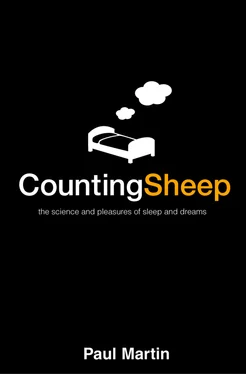The Science and Pleasures of Sleep and Dreams
PAUL MARTIN
William Collins
An imprint of HarperCollins Publishers 1 London Bridge Street London SE1 9GF
www.harpercollins.co.uk
Published by Harper Press 2003
First published in Great Britain by HarperCollins Publishers 2002
Copyright © Paul Martin 2002
Paul Martin asserts the moral right to be identified as the author of this work
All rights reserved under International and Pan-American Copyright Conventions. By payment of the required fees, you have been granted the non-exclusive, non-transferable right to access and read the text of this e-book on-screen. No part of this text may be reproduced, transmitted, downloaded, decompiled, reverse engineered, or stored in or introduced into any information storage and retrieval system, in any form or by any means, whether electronic or mechanical, now known or hereinafter invented, without the express written permission of HarperCollins e-books.
HarperCollins Publishers has made every reasonable effort to ensure that any picture content and written content in this ebook has been included or removed in accordance with the contractual and technological constraints in operation at the time of publication.
Source ISBN: 9780006551720
Ebook Edition © MARCH 2016 ISBN: 9780007406784
Version: 2016-02-11
Cover
Title Page
Copyright
PART I: PRELIMINARIES
1: A Third of Life
A sleep-sick society?
The universal imperative
Half asleep
Nice, not naughty
PART II: INSUFFICIENCIES
2: Sleepy People
Are we sleep-deprived?
Are you sleep-deprived?
Reasons for not sleeping
Ancient and modern
Sleepy drivers
Sleepy pilots
Sleepy doctors
The madness of politicians
Truly, madly, sleepily
The price of eternal vigilance is liberty
3: Dead Tired
Sleepiness
Fighting the beast
A soil for peevishness
Tired people are stupid and reckless
Alcohol, beauty and old age
Champion wakers
Uses and abuses
4: The Golden Chain
A waking death
Body and soul
Sleep, immunity and health
The Battle of Stalingrad
Sleepless in hospital
PART III: MECHANISMS
5: The Shapes of Sleep
Measuring sleep
Falling asleep again, what am I to do?
The sleep cycle
The paradoxical world of REM
The sleep cycle continued
Waking up
The quality of sleep
Meditating – or only sleeping?
6: Morpheus Undressed
The rhythms of life
So SAD
Larks and owls
Genes and sleep
A sleeplessness that kills
7: Strange Tales of Erections and Yawning
Nocturnal erections
The mystery of yawning
8: Friends and Enemies of Sleep
Brother caffeine
Sister alcohol
Tobacco
Food for sleep
Exercise is bunk, isn’t it?
Things that go bump in the night
Shift work
Poppy, mandragora and drowsy syrups
Hypnotic exotica
PART IV: DREAMS
9: The Children of an Idle Brain?
To sleep, perchance …
Do flies dream?
A dream within a dream?
Dreaming as madness
Are dreams meaningful?
Like wine through water
Can dreams be sinful?
10: A Second Life
A creative state
Stevenson’s Brownies
Lucid dreams
The great dreamer
PART V: ORIGINS
11: From Egg to Grave
Screaming babies
Bad children
Yawning youth
Old and grey and full of sleep
12: The Reason of Sleep
The evolution of sleep
What is sleep for?
What is REM sleep for?
Reverse learning
To sleep, perchance to learn
Should machines sleep?
PART VI: PROBLEMS
13: Bad Sleepers
An intolerable lucidity
Why can’t you sleep?
Storm and stress and sleep
What to do?
Staying awake
14: Dark Night
Walking and talking
Nightmares, night terrors, sleep paralysis and the Old Hag
Moving sleep
Midnight feasting
Soggy sheets
Aching heads
Troubled guts
Troubled minds
Sudden nocturnal death
Narcolepsy
15: Pickwickian Problems
The wonderful world of snoring
Silence is golden
Breathless in bed
Consequences – mostly dire
Unblocking those tubes
PART VII: PLEASURES
16: And So to Bed
A brief history of beds
Sleeping partners
17: An Excellent Thing
Puritans and hypocrites
Naps, nappers and napping
Sweet dreams
Blessed oblivion
Give sleep a chance
In praise of horizontalism
Keep Reading
References
Index
Acknowledgements
About the Author
Praise
Also by the Author
About the Publisher
PART I Preliminaries
Man … consumes more than one third of his life in this his irrational situation.
Erasmus Darwin, Zoonomia (1801)
Sleep: a state so familiar yet so strange. It is the single most common form of human behaviour and you will spend a third of your life doing it – 25 years or more, all being well. When you die, a bigger slice of your existence will have passed in that state than in making love, raising children, eating, playing games, listening to music, or any of those other activities that humanity values so highly.
Sleep is a form of behaviour, just as eating or socialising or fighting or copulating are forms of behaviour, even if it is not the most gripping to observe. Most of the action goes on inside the brain. It is also a uniquely private experience, even when sharing a bed. When we are awake we all inhabit a common world, but when we sleep each of us occupies a world of our own. Most of us, however, have precious little awareness of what we experience in that state. Our memories of sleeping and dreaming mostly evaporate when we awake, erasing the record every morning.
Many of us do not get enough sleep and we suffer the consequences, often without realising what we are doing to ourselves. The demands of the 24-hour society are marginalising sleep, yet it is not an optional activity. Nature imposes it upon us. We can survive for longer without food. When our sleep falls short in quantity or quality we pay a heavy price in depressed mood, impaired performance, damaged social relationships and poorer health. But we usually blame something else.
Sleep is an active state, generated within the brain, not a mere absence of consciousness. You are physiologically capable of sleeping with your eyelids held open by sticking plaster, bright lights flashing in your eyes and loud music playing in your ears. We shall later see how science has revealed the ferment of electrical and chemical activity that goes on inside the brain during sleep, and how the sleeping brain operates in a quite different mode from waking consciousness. We shall see too how lack of sleep erodes our quality of life and performance while simultaneously making us more vulnerable to injuries and illness. Science amply supports William Shakespeare’s view that sleep is the ‘chief nourisher in life’s feast’.
Читать дальше












